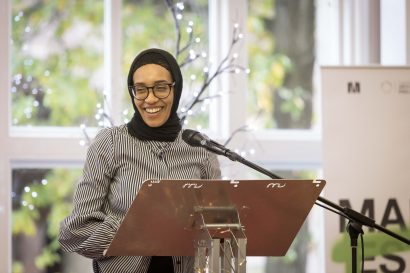 MLF Chapter & Verse
MLF Chapter & Verse
The Manchester Literature Festival Blog
Review: The Things I Would Tell You
Maryam Hessavi reviews our event with writers from the anthology performing their work
Hosted by award-winning Sabrina Mahfouz, The Things I Would Tell You event offered insights, experiences and performance from Asma Elbadawi, Nafeesa Hamid and Hibaq Osman, who form part of the twenty-two strong compilation of writers self-identified as ‘British Muslim women’. Sabrina, who shares this identification, as a British Egyptian, is a well-established playwright, poet, screenwriter, and essayist. She has published multiple plays and performed her poetry through a range of mediums, with her debut collection of poetry How You Might Know Me, published by Out-Spoken Press.
Sabrina, who initiated the project and compiled the anthology by and through her ‘work with young girls in secondary schools’, discussed the inspiration behind the compilation of the work, as having been spurred by the necessity to make successful, inspirational and relatable British Muslim women accessible to the kinds of young girls she works with. Sabrina also conveyed the need to dispel the ‘narrow image of the Muslim Woman’. The anthology embraces this philosophy in its broad spectrum of content, form and style, featuring plays, fiction and poems that gravitate between spatial multiplicities and more. Content aside, the work as a whole lays out its preoccupations and protests in striking and distinctive formal manner.
The young women performed and read sections of their work respectively, in and out of discussions with our host and co-author/editor, Sabrina Mahfouz.
Nafeesa Hamid, a Birmingham/ Derby based playwright, poet and spoken word artist, performed a series of poems linked to ‘How Men Are Made’. Some of the poems she read remain unpublished, due to what Nafeesa expressed as a necessity for publication censorship, for personal reasons. These poems were not for the faint hearted, nor the prude. They were bold, explicit and explored highly intimate, social and religious taboos, along with other lines of interest traced through Nafeesa’s work including mental health, identity, the female body and more. They were striking, boasting a content and style that might be referred to as a sort of poetic Marmite, for their disregard of conventional conservatism in several respects. The charge of these pieces came predominantly from Nafeesa’s confident and animated delivery, which showcased her spoken word background. It did at times feel that the performance aspect of the pieces overshadowed a certain intimacy with the language that still feels as though it could be given time or space to permeate the work.
Second to perform was Bradford-born poet and visual artist of Sudanese heritage, Asma Elbadawi. Originally from a visual arts and sports background, she discussed her utilisation of poetry as a medium and platform through which she was able to use the scope of her skillset to affect change in the world. Asma campaigned for the right for women to wear hijab in professional basketball tournaments, which has recently been passed as a result of her efforts. Asma’s opening poem ‘Summer’ began in song, which added a new dimension to the performance – perhaps a mark of stylistic protest, given the potential ramifications of such an act in other parts of the world. Again, the poems were rich and diverse in content, albeit exhibiting a sense of tentativeness where performance and general content sometimes overshadowed the attention to detail, visually and linguistically.
All the pieces were passionate, emotionally wrought, brave and bold or just right out there. Their lyricism and sound patterns were skilfully crafted – but I was still craving the anchorage of some more distinctive metaphor, or some clarified distinctive imagery.
Last to share her poems was West London raised Somali writer Hibaq Osman, who did discuss some of the drawbacks of her previously more performance-led reading styles as affecting written style. For Hibaq, a recent paring down of the performance element has allowed for more intimate interactions with the poems she writes, removing a barrier and allowing her to be ‘more real’ to herself, which showed in her work, and her readings. All three writers demonstrated skill, daring, and lyrical excellence when engaging with powerful and important topics, but Hibaq’s poems, for me, felt most at home with themselves, and seemed to strike a pertinent connection with the audience. Perhaps two of the sharpest and most arresting lines throughout the event were from her poem ‘Matchstick Lips’: ‘our bones ripped away from muscle, / sharpened and used as spears’.
‘How To Wash Away False Kisses’ and her final poem, ‘Amin Ahmed’ which was written for her brother, presented particularly harrowing autobiographically influenced works which broached topics of abuse and loss and were unassumingly assured of the emotions and realities they harboured. It was Hibaq’s poem title ‘The Things I Would Tell You’, also written for her brother, which was fittingly used for the title of the anthology.
Following excerpts from other authors in the anthology, Sabrina read a passage from her own piece ‘Battleface’, an engagingly humorous yet absurdly relevant play about a Muslim and a spy….
Did anyone else feel the slightly overbearing ‘Security’ presence that day? – Only joking!…(ish).
Maryam Hessavi is a student at the Centre for New Writing. This post also appeared on The Manchester Review.
Image: Chris Bull
